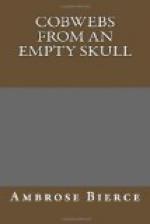To moles, the body of a lifeless mule
A dead mule’s carcase is, and nothing more.
LXXXVIII.
“I think I’ll set my sting into you, my obstructive friend,” said a bee to an iron pump against which she had flown; “you are always more or less in the way.”
“If you do,” retorted the other, “I’ll pump on you, if I can get any one to work my handle.”
Exasperated by this impotent conservative threat, she pushed her little dart against him with all her vigour. When she tried to sheathe it again she couldn’t, but she still made herself useful about the hive by hooking on to small articles and dragging them about. But no other bee would sleep with her after this; and so, by her ill-judged resentment, she was self-condemmed to a solitary cell.
The young reader may profitably beware.
LXXXIX.
A Chinese dog, who had been much abroad with his master, was asked, upon his return, to state the most ludicrous fact he had observed.
“There is a country,” said he, “the people of which are eternally speaking about ‘Persian honesty,’ ‘Persian courage,’ ’Persian loyalty,’ ‘Persian love of fair play,’ &c., as if the Persians enjoyed a clear monopoly of these universal virtues. What is more, they speak thus in blind good faith—with a dense gravity of conviction that is simply amazing.”
“But,” urged the auditors, “we requested something ludicrous, not amazing.”
“Exactly; the ludicrous part is the name of their country, which is—”
“What?”
“Persia.”
XC.
There was a calf, who, suspecting the purity of the milk supplied him by his dam, resolved to transfer his patronage to the barn-yard pump.
“Better,” said he, “a pure article of water, than a diet that is neither fish, flesh, nor fowl.”
But, although extremely regular in his new diet—taking it all the time—he did not seem to thrive as might have been expected. The larger orders he drew, the thinner and the more transparent he became; and at last, when the shadow of his person had become to him a vague and unreal memory, he repented, and applied to be reinstated in his comfortable sinecure at the maternal udder.
“Ah! my prodigal son,” said the old lady, lowering her horns as if to permit him to weep upon her neck, “I regret that it is out of my power to celebrate your return by killing the fatted calf; but what I can I will do.”
And she killed him instead.
Mot herl yaff ecti onk nocksal loth ervir tu esperfec tlyc old.[A]
[Footnote A: The learned reader will appreciate the motive which has prompted me to give this moral only in the original Persian.—TRANSLATOR.]




